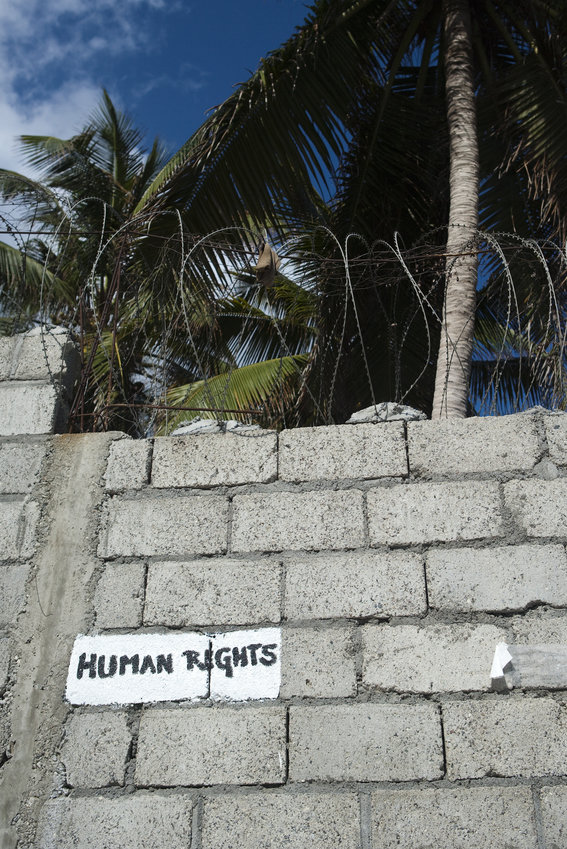Human rights are the top priority
Special protection for children
GIZ adopted a Child Protection Policy in 2020, in which it expresses its commitment in this area. The company recognises that it is often not easy to understand whether children’s wellbeing has been taken into account. For example, what is the situation regarding products that GIZ buys and uses? Is child labour involved in their manufacture? The idea of the new policy is to identify potential weaknesses in corporate processes and within projects in order to ensure that children are protected.

The policy includes specific measures: when concluding a contract with GIZ, contractors must undertake to comply with international child protection standards. A set of guidelines lists products where there is a particularly high risk of child labour. A guidance document provides information on what to pay attention to when producing and posting images on social media that show children. For project work, the audit tool for integrated context and human rights analysis (iPCA) has been revised. It includes specific key questions to record a project’s particular context. The tool helps us to identify any negative impacts that projects might have on children, in particular any possible violence.
GIZ also has a whistleblower portal: anyone who suspects that children’s rights are being infringed as a result of GIZ and its work can use this portal to report it (anonymously if they wish).
Human rights are integral to our work
As a federal enterprise, following up on our human rights due diligence in our own procedures and projects is part and parcel of our work. All of our actions are in line with the Basic Law of the Federal Republic of Germany, especially the guarantees of respect for human rights it contains, and with Germany’s commitments to human rights under international law. As a company, we also subscribe to the Ten Principles of the UN Global Compact and observe the UN Guiding Principles on Business and Human Rights and the OECD Guidelines for Multinational Enterprises. In addition, we are guided by the German Government’s National Action Plan for Business and Human Rights.
We make every effort to respect and promote human rights. Our Human Rights Policy provides internal guidance for our actions. It is part of our understanding of sustainable development and reinforces existing rules, procedures and activities. At the same time, it demonstrates to our commissioning parties, business partners, suppliers, partner institutions and the public at large the importance that GIZ attaches to human rights. We updated the policy in 2020, which included adding a reference to our new Child Protection Policy.

Governance structure for human rights due diligence
Efficient risk management
At project level, we use the Safeguards+Gender Management System when designing our projects to identify at an early stage any unintended adverse impacts on human rights they may have. At the same time, we develop measures and approaches to prevent or mitigate these effects.
We have also set ourselves clear targets in our Sustainability Programme 2021–2025 to enable us to better identify any human rights risks associated with our corporate processes. As part of this, all GIZ staff will by 2023 have access to information and training on human rights due diligence to enable them to acquire broader and more in-depth knowledge. Steps taken to achieve this include updating mandatory onboarding courses for all employees in Germany and abroad and implementing additional awareness-raising measures for people in key positions in at least 25 country offices. Professional risk management also requires the compilation of adequate data on the corporate processes in which human rights risks may arise and on how we can deal with these risks. We will upgrade this data set accordingly by 2023.
Risk-reduction measures
GIZ has put a raft of risk-reduction measures in place. They include, for example:
- Code of Ethics: GIZ’s ethical principles are set out in a Code of Ethics, which all staff must adhere to.
- Business partner screening (BPS): this is an integral and mandatory part of risk management at GIZ. In order to be successful, GIZ must operate responsibly when delivering its services. It therefore undertakes to exercise extreme care and examines the risks associated with working with private sector partners, commissioning parties and bodies providing grants. To this end, business partner screening is a standard element of all cooperation arrangements and activities with companies and public-benefit organisations involving third-party funding. The aim is to highlight any possible risks before a project begins. If it emerges that the planned cooperation entails potential risks, we integrate risk-mitigation measures into the strategy of the future project. As part of the process, we also review human rights aspects.
- Procurement: GIZ counteracts human rights risks in its supply chain through its Sustainable Procurement Policy, by integrating sustainability criteria into its General Terms and Conditions of Contract, and various other measures.
Effective grievance mechanism
GIZ responds appropriately to any information about human rights violations in our projects and corporate processes. They can be submitted online to the whistleblower portal. The Compliance and Integrity Unit looks into them carefully and treats them with complete confidentiality. Information may also be submitted anonymously through the portal. If information turns out to be substantiated, we ensure to the extent possible that there are no negative consequences for the whistleblower.
As part of our Sustainability Programme 2021–2025, by 2023 we want to increase the extent to which our human rights grievance mechanism meets the criteria for effectiveness set out in the UN Guiding Principles on Business and Human Rights. To do so, we have put a policy in place to strengthen protection for whistleblowers. We are making our grievance reporting channels and procedures more visible by communicating information about them both internally and externally. In addition, we aim to make our grievance mechanism more accessible: this applies to our country offices in particular, which we support by providing guidelines and country-specific advice.
Other grievance channels
There are also internal mechanisms for filing grievances at GIZ, including through the Central Staff Council, the Equal Opportunities Commissioner and the Disabled Persons’ Representation. The Central Staff Council’s task is to represent employees’ interests at company level. It is made up of six delegates from the three staff councils in Berlin, Bonn and Eschborn. All members of staff who have a grievance can contact the Central Staff Council.
Whereas enquiries about disability issues come under the responsibility of the Disabled Persons’ Representation, issues connected with protection against discrimination on the grounds of gender and protection against sexual harassment are dealt with by the three equal opportunities commissioners in Berlin, Bonn and Eschborn.
The Human Resources Department also has a complaints team, which deals with verbal or physical discrimination based on GIZ’s Code of Ethics. All complaints are handled confidentially – both when they are being investigated and when communicating the outcome of the review.
Information on the following Sustainable Development Goals (SDGs) can be found on this page:
